
Key Takeaways
- When asked to rate mathematics on a scale from 1 (extremely unimportant) to 10 (extremely important) for the purpose of daily use, respondents ranked mathematics second (7), right after English (8).
- While over 75% of respondents reported learning geometry and algebra, less than 50% of them actually found these subjects important in their everyday lives.
- According to respondents, the most important daily life skills that incorporate mathematics are budgeting (76.7%), computer use (64.8%), and understanding credit (58.1%).
Mathematics Bias
Your memories of learning mathematics in elementary school may be tainted by hours spent at the kitchen table trying to understand long division or memorize multiplication tables. You may even feel a flutter of anxiety as you reminisce about furiously trying to finish your geometry test before time was up. Many grew up with a true disdain for mathematics, feelings that may persist into adulthood. Though, being good at mathematics – and even enjoying it – may have a plethora of positive and unexpected impacts on your life. In fact, Phys.org recently reported that there may even be a correlation between mathematics and athletic skills.
What’s certain is that having a good mathematical foundation has been proven to pave the way for future success in both academic and real-life settings. In order to gauge people’s feelings toward their own education and how it applies to their adult life, we surveyed 1,005 respondents about their personal experiences with mathematical education during their childhood and teenage years.
The People Versus Algebra
Mathematics, in itself, is a very broad subject, ranging from arithmetic to calculus. But which of these branches are actually perceived as useful in a practical sense?
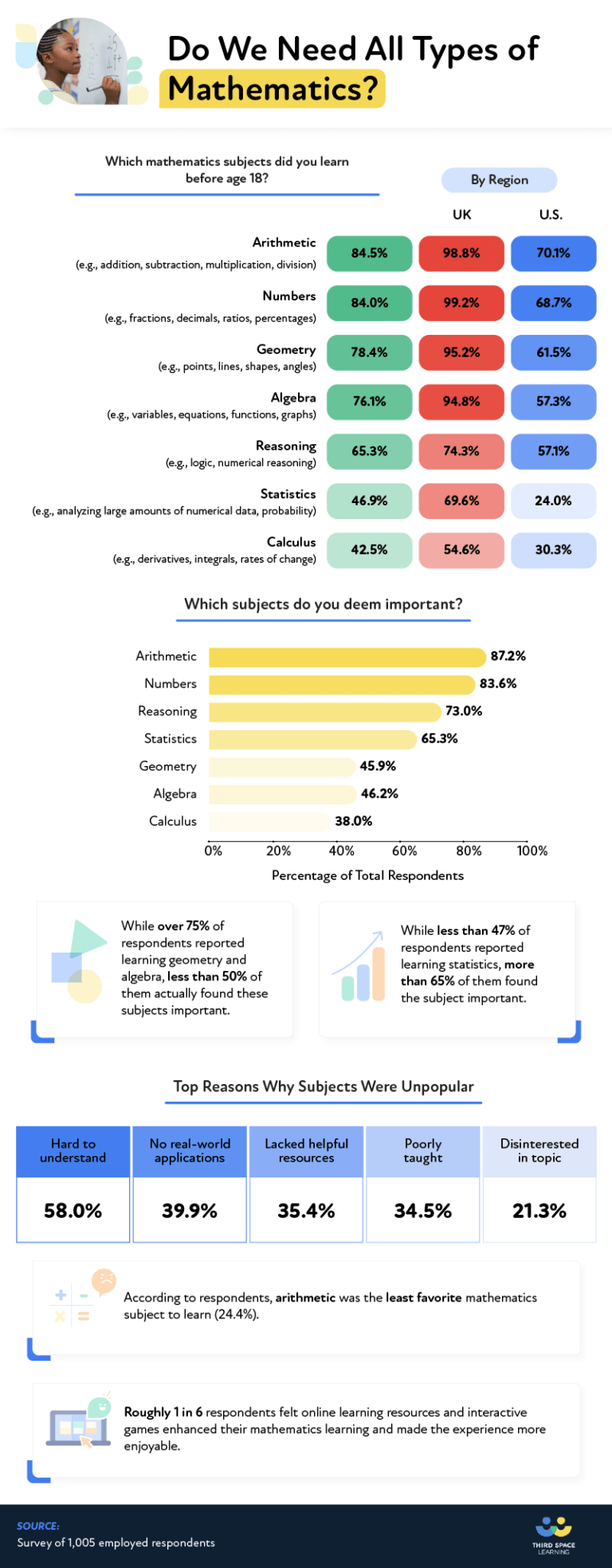
Out of the hundreds of British and American adults we surveyed about their mathematical education before adulthood, people from the United Kingdom were more likely than Americans to have learned specific branches of mathematics before the age of 18. Almost all Britons had studied arithmetic and numbers before reaching adulthood, while less than three-quarters of Americans had. Arithmetic and numbers were also deemed important by 87.2% and 83.6% of respondents, respectively, meaning there is likely a proportion of Americans that never learned the skills they deem most important.
The main reason certain subjects were unpopular was that they were considered difficult to understand. Algebra was voted the least favourite of all subcategories, with 24.4% of participants ranking it as their most hated mathematical subject. Reasoning, although not as disliked as algebra, was mostly disliked due to a lack of helpful resources and poor teaching. On a more positive note, around 17% of participants accredited online learning resources as positive enhancements to their learning experience. Third Space Learning offers an extensive library of online primary maths resources and GCSE maths revision resources.s
Despite algebra being named as respondents’ least favorite mathematics class, success in the subject may be a good predictor of future accomplishments in high school and beyond. The American Institute for Research reported that success in both algebra I and algebra II in middle and high school is a strong indicator of future success inhigher educational institutions.
Beyond The Classroom
While not all mathematics topics are popular, which ones actually come into play more in the real world?
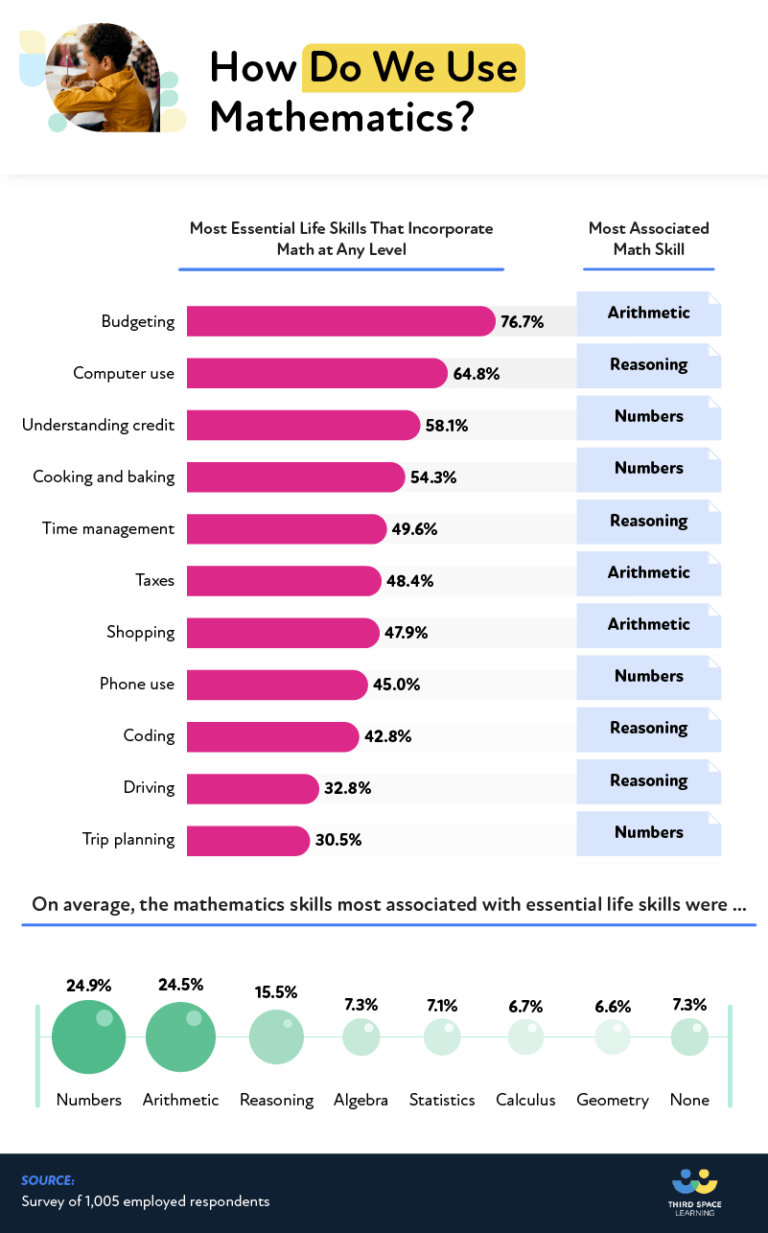
In terms of real-world skills, 76.7% found budgeting to be the most essential life skill that requires knowledge of math, while computer use came in second at 64.8%. Conversely, the least important life skill that requires math was deemed to be trip planning, with only 30.5% believing it to be essential. Of all real-world tasks that incorporate math at any level, the three recurring topics associated with those skills were arithmetic, numbers, and reasoning. Subjects like geometry, statistics, algebra, and calculus were each associated with any essential life skill by less than 8%.
The importance of budgeting can’t be stressed enough. According to Invesopedia, the act of budgeting can lead to many financial positives like awareness, reaching long-term large purchasing goals, and a happier retirement.
Mathematics Does Matter
In a more general sense, where does mathematics fall in among other academic subjects? We gathered thoughts from our respondents to find out how important mathematics is and whether it is easy to learn or not.
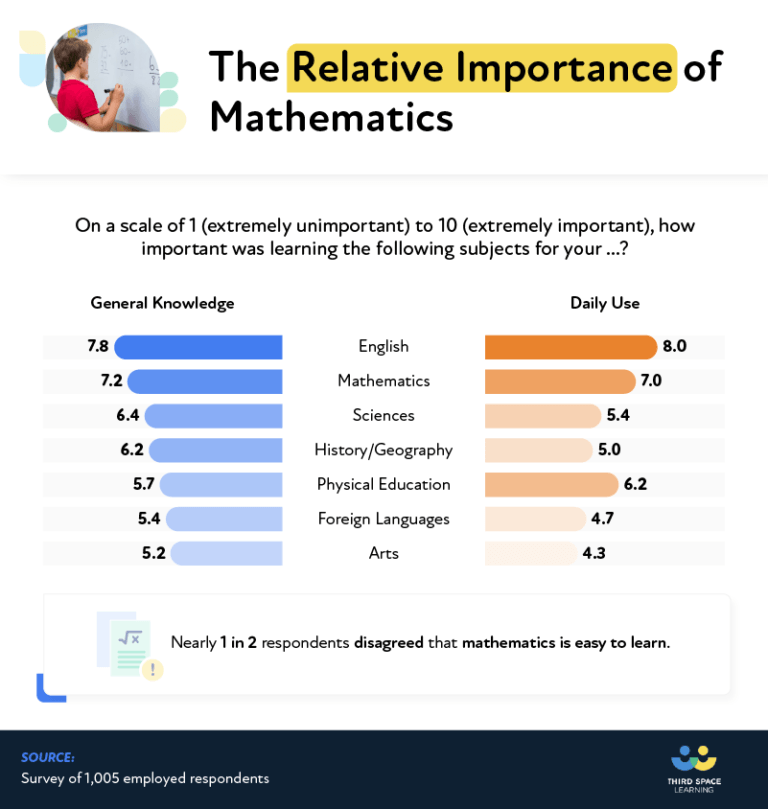
Over 1,000 employed respondents from the U.S. and UK were polled on a number of questions about mathematics, both in the context of their school days and in adult life. Based on the survey, mathematics was ranked as the second-most important subject to learn in both the general knowledge and daily use categories.
When it came to ease of learning mathematics, nearly 50% of respondents didn’t feel it was easy. What’s interesting to note is that the method of learning (in person versus online) did not change the general consensus regarding the ease of learning mathematics. Third Space Learning’s online maths tuition of targeted maths intervention has proved highly effective.
Not only is mathematics important for everyday use, but it can also be used as a predictive model for future success. In a study from Rutgers University, early childhood success in mathematics was shown to positively correlate to a child’s memory and reasoning, among other more complex behaviors, later in their childhood and adult life.
Altered Attitudes
Perceptions of mathematics and how hard it is to learn could be greatly altered by the way it is learned. But what did our respondents think was the most optimal way of learning it?
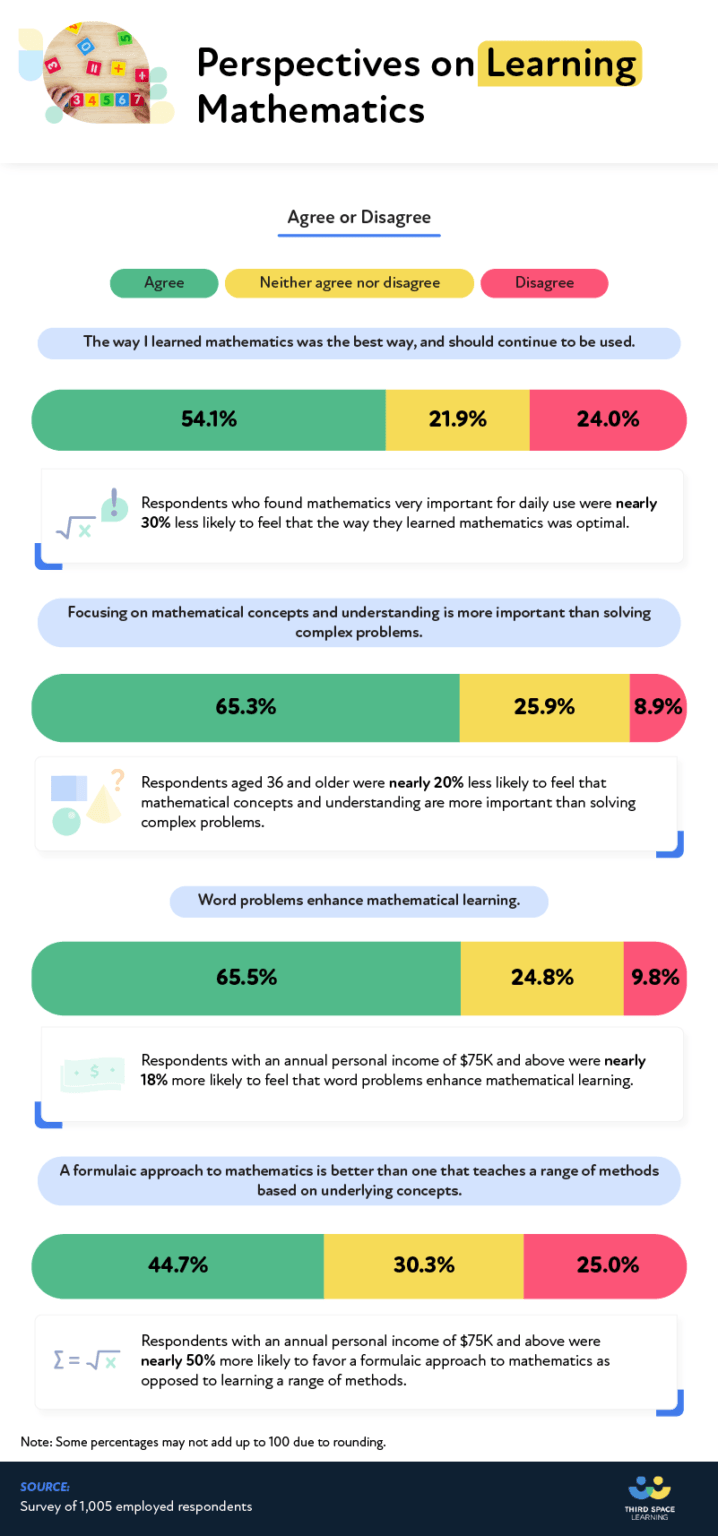
Among our respondents, 54.1% agreed that the way they learned mathematics was optimal, but those that found mathematics very important for daily use were almost 30% less likely to feel this way. Just over 65% believed focusing on concepts and general understanding was more important than complex problem solving, although folks above the age of 36 were less likely to agree with this statement. People with annual incomes of $75K and above were 18% more likely than those earning less to feel word problems enhance mathematical learning. Additionally, higher earners were 50% more likely to believe in a formulaic approach to mathematics as opposed to learning a range of methods.
The United States was ranked 38th in mathematics in the Programme for International Student Assessment (PISA), which is one of the biggest cross-national tests for 15-year-olds around the globe. Despite this subpar rating, there is no reason to believe that Americans are inherently worse at mathematics compared to other nationalities. It is more likely early curriculums and attitudes toward mathematics make all the difference.
USA Today brings up a good point in an article published in 2020; mathematics is taught differently in other countries than it is in the United States. While other countries focus on creative thinking to solve complex problems, most curricula in the U.S. still focus on memorization and formulas. This outdated approach is likely what’s keeping the country from ranking globally in terms of mathematics scores. The article also suggests that teaching mathematics subjects linearly may be a contributing factor. Other countries approach the subject in an integrative way; incorporating topics of algebra, geometry, statistics, and more in a single school year.
A New Way To Learn?
When is the right time to learn each branch of mathematics? We asked our survey respondents about when they learned these topics, if at all, and how they would structure their ideal mathematics curriculum.
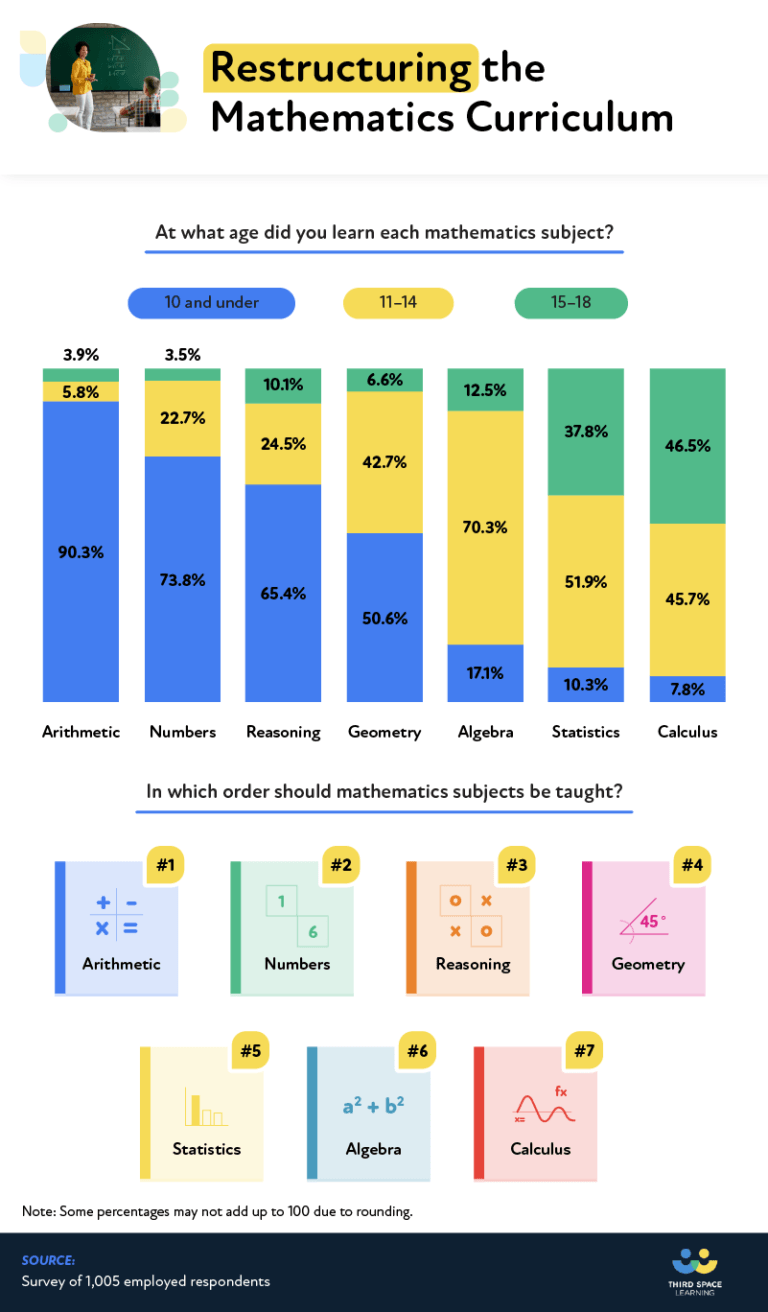
The majority of people surveyed learned arithmetics, numbers, reasoning, and geometry before or at the age of 10, and algebra and statistics from ages 11 to 14. About half of the respondents learned calculus from ages 11 to 14, while the other half learned the subject in their later teen years. Participants were also asked to decide which order they believed mathematical subjects should be taught in. Based on these rankings, the consensus is that statistics should be taught before algebra, despite the survey implying students were more likely to learn algebra first.
Although respondents may agree that mathematical subjects should be taught linearly, there is a case to be made for an integrative approach to learning math. An integrative approach to mathematics focuses on multiple subjects at a time as opposed to just one. A study published by the National Council of Teachers of Mathematics claimed that high school students given an integrative curriculum were more likely to outperform those given a subject-specific curriculum.
The Future Is Bright
In today’s world, mathematics isn’t just something you need to get your high school diploma. The subject and its subtopics have real-world applications that can enhance many aspects of life from budgeting to shopping. According to our respondents, though, mathematics isn’t always easy. American respondents were less likely than British respondents to have learned basic mathematical concepts before the age of 18, and all respondents found a lack of understanding and poor teaching to impact their learning of certain subjects.
The general agreement was that approaching mathematics through the lens of real-life problems while gaining a better understanding of mathematical concepts was the best way to learn effectively. If you’re looking for a way to mend the foundational gaps students may have in their knowledge – while also boosting their problem-solving skills and confidence – visit Third Space Learning for more information. With the help of pupil premium funding and the National Tutoring Programme, empower students and help them take their first steps toward a successful future.
Methodology and Limitations
For this study, we surveyed 504 employed respondents from the UK via Prolific and 501 employed respondents from the U.S. via Amazon MTurk. 55.5% of respondents identified as women, 44% identified as men, and the remaining 0.5% identified as nonbinary. Additionally, the average age of respondents was 35.2 years with a standard deviation of 9.7 years.
The main limitation of this portion of the study is its reliance on self-report, which is faced with several issues, such as, but not limited to, attribution, exaggeration, recency bias, and telescoping.
Fair Use Statement
Want to let other people know about the importance of strong mathematical foundations? Feel free to share the above graphics and data for noncommercial use. Just remember to properly cite thirdspacelearning.com and link back to this page when doing so.